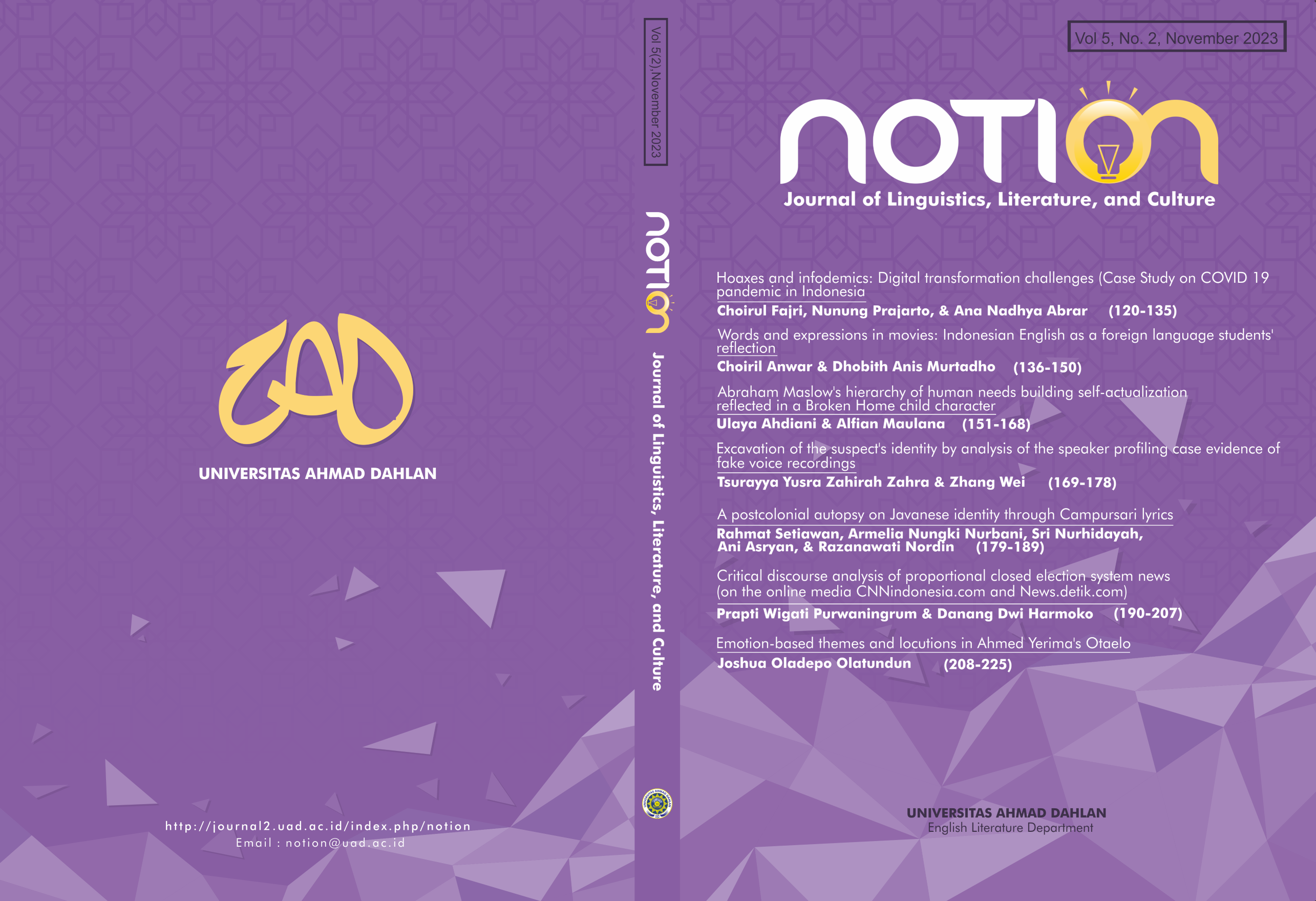A postcolonial autopsy on Javanese identity through Campursari lyrics
DOI:
https://doi.org/10.12928/notion.v5i2.8161Keywords:
Submissive , East , Identity , CampursariAbstract
Campursari seems to reflect submissive identity, but in deconstructive perspective, the identity is chaotic space. By using postcolonial perspective, this research nails its analysis. The approach used in this research is library research with postcolonial approach. The data are the selected lyrics of Didi Kempot’s songs, they are Cidro, Tatu, Suket Teki, Pamer Bojo, and Sewu Kutho. The technique of data collection is documenting and the technique data analysis is interpretation. The result shows that Didi Kempot’s Campursari songs affirm the submissive way of loving. Cidro represents inferiority, Tatu represents surrender, Suket Teki represents inferiority, Pamer Bojo represents betrayal, and Sewu Kutho represents surrender. Those broken love defines Javanese identity which is seen submissive (dominated), but simultaneously, it also exposes a deconstructive point that loving is releasing, and releasing shows non-dominated side.
References
Achmad, Z. A., Ida, R., & Mustain, M. (2020). A virtual ethnography study: The role of cultural radios in campursari music proliferation in East Java. ETNOSIA : Jurnal Etnografi Indonesia. https://doi.org/10.31947/etnosia.v5i2.9787
Bhabha, H. K. (1994). The location of culture (routledge classics). In The location of culture.
Bhabha, H. K. (2016). Of mimicry and man. In Postcolonial Studies. https://doi.org/10.1002/9781119118589.ch3
Boehmer, E. (1993). Transfiguring: Colonial body into postcolonial narrative. NOVEL: A Forum on Fiction. https://doi.org/10.2307/1345836
Choudhury, B. (2016). Homi K. Bhabha: The location of culture. In Reading Postcolonial Theory: Key texts in context.
Fraser, D., Masson, J. M., & McCarthy, S. (1996). When elephants weep: the emotional lives of animals. Animal Behaviour.
Goleman, D. (2011). The brain and emotional intelligence: New insights. In Xtemp01.
Hamadi, L. (2014). Edward Said: The postcolonial theory and the literature of decolonization. European Scientific Journal.
Huda, A. M. (2016). The identity of Javanese women (The study of phenomenology toward indonesian migrant women workers). JARES (Journal of Academic Research and Sciences). https://doi.org/10.35457/jares.v1i1.506
Ikas, K., & Wagner, G. (2008). Communicating in the third space. In communicating in the Third Space. https://doi.org/10.4324/9780203891162
Lary, D. (2007). Edward said: Orientalism and occidentalism. Journal of the Canadian Historical Association. https://doi.org/10.7202/016587ar
Lundquist, C. R. (2019). What love is and what it could be. Teaching Philosophy. https://doi.org/10.5840/teachphil2019423115
Nagel, J. (1994). Constructing ethnicity: Creating and recreating ethnic identity and culture. Social Problems. https://doi.org/10.2307/3096847
Rahmawati, L. P. (2017). Eksistensi musik campursari karya didi kempot. Gema.
Rutherford, J. (1990). The third space (Interview with Homi Bhabha). In Identity: Community, Culture, Difference.
Sizer, L. (2019). Sad songs say so much: The paradoxical pleasures of sad music. Journal of Aesthetics and Art Criticism. https://doi.org/10.1111/jaac.12659
Sudrajat, S., Suryo, D., & Siswoyo, D. (2018). Moral values of javanese leader in serat wedhatama. Asian Social Science. https://doi.org/10.5539/ass.v14n3p49
Upstone, S. (2013). Spatial politics in the postcolonial novel. In Spatial Politics in the Postcolonial Novel. https://doi.org/10.4324/9781315610283
Widyawati, N., & Santoso, W. M. (2020). Didi Kempot: Masculinity and actor in circulation and consumption in industrial revolution 4.0. https://doi.org/10.2991/assehr.k.200818.043
Zisook, S., & Shuchter, S. R. (1991). Depression through the first year after the death of a spouse. American Journal of Psychiatry. https://doi.org/10.1176/ajp.148.10.1346
Downloads
Published
Issue
Section
License
Copyright (c) 2023 Rahmat Setiawan, Armelia Nungki Nurbani , Sri Nurhidayah, Ani Asryan, Razanawati Nordin

This work is licensed under a Creative Commons Attribution 4.0 International License.
Authors who publish their articles in NOTION: journal of Linguistics, Literature, and Culture agree to the following terms:
- Authors retain the copyright and grant the journal right of first publication with the work simultaneously licensed under a Creative Commons Attribution 4.0 International License that allows others to share the work with an acknowledgement of the work's authorship and initial publication in this journal.
- Authors are able to enter into separate, additional contractual arrangements for the non-exclusive distribution of the journal's published version of the work (e.g., post it to an institutional repository or publish it in a book), with an acknowledgement of its initial publication in this journal.
- Authors are permitted and encouraged to post their work online (e.g., in institutional repositories or on their website) prior to and during the submission process, as it can lead to productive exchanges, as well as earlier and greater citation of published work.





